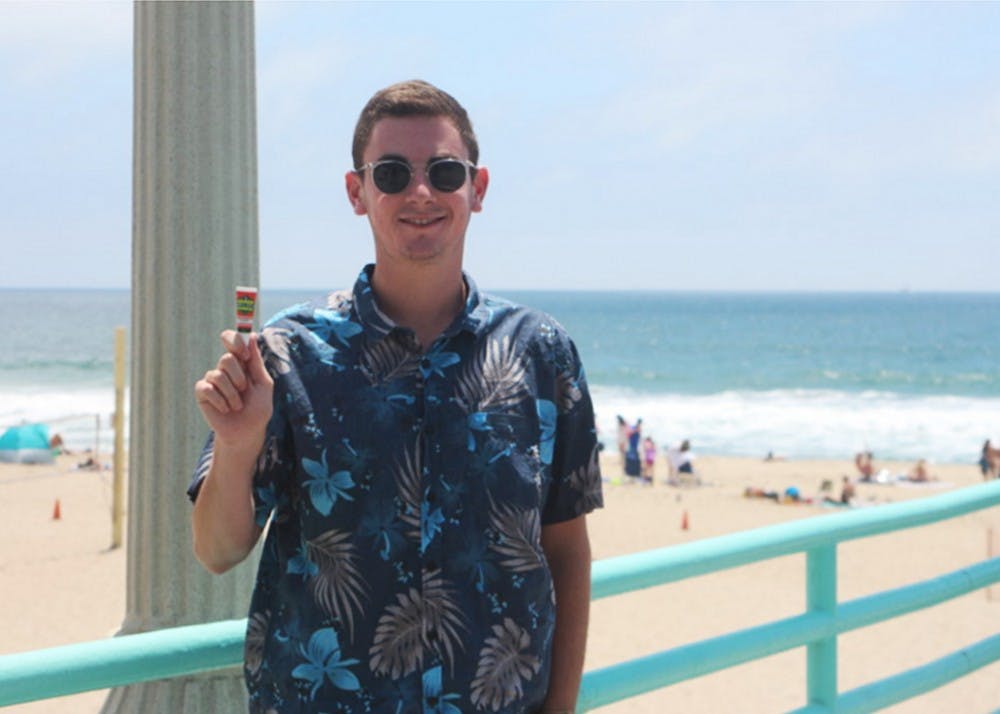Between the serves and sets in his tennis matches, a then-14-year-old Garrett Greller started feeling severe, dull pain in his back, knees, hips and ankles.
He had dreams of playing tennis in college and was afraid this pain was going to get in the way of that.
After seeing several different doctors, Greller was diagnosed with juvenile arthritis at age 16 and had to stop almost all physical activity. When it came to treating his arthritis, he had trouble finding something that eased his pain.
“I tried everything the doctors gave me,” Greller said. “I tried medicine and shots in the leg. The prescription medications all made me throw up and I was prescribed opioids and none of them worked.”
Greller, now a senior media advertising major, knew he needed something different.
Through a family friend, he was referred a marijuana-based topical product that helped him with his pain around age 18. While this product is legal in his home state of California, Greller discovered that it is illegal in Indiana. He would not be able to use this while at IU.
After knowing Greller was moving to Indiana, Garrett and his father, Howie Greller, decided to start working on a Cannabidiol-based product for people suffering from pain like Garrett.
They decided to create Uncle Bud’s, a hemp-based topical for pain relief to help to people like Greller.
Cannabidiol, usually known as CBD, is a cannabis compound that does not contain tetrahydrocannabinol which is the psychoactive part of marijuana. If a product is hemp-based and contains 0.3 percent or less of THC, then it is legal in all of the United States.
Garrett said he had entrepreneurship dreams from a young age and wanted to start something with his father, Howie. Garrett and his best friend started their first business selling duct tape accessories at age 12.
“I still have the duct tape checkbook he made me,” Howie said. “I could see the entrepreneurship spirit in him early on.”
At Thanksgiving dinner one year, Howie announced the business plan to the rest of their family, and everyone agreed to help in any way they could.
Howie was able to contact a Food and Drug Administration-backed manufacturer in Texas through a close friend to create their product, and Garrett designed the packaging and began marketing the product.
Garrett used crowdfunding website Indiegogo to kickstart his project and raised over 75 percent of his $20,000 goal within the first 10 days, but he said he was then shut down after legal troubles.
“I was projected to reach about $100,000, but websites like Indiegogo work based on algorithms and once it sees the word CBD, it instantly shuts it down,” Garrett said. “This has happened several other times, last time in October, with banks, too.”
These setbacks slowed Garrett down but did not stop him, he said. His junior of college year, he was able to start selling his product.
What started out as a small consumer product has grown into a business that sells the product in several places online and in stores in 16 different states, Greller said. Although it is not offered stores in Indiana, other states include Michigan, Texas and Illinois.
The Grellers’ current goal is to get the product out to more athletes, physical therapists and chiropractors.
Greller said the pair has kept the business running on a low budget by controlling the business all by themselves and using profits from the business to pay the costs to produce the product.
“We have people that email me telling me that they love this product,” Garrett said. “We’ve never had anyone return the product and say it didn’t work, and every day I have people tell me that this is the only product that has ever worked for them.”
Along with being able to have a product to help ease his pain, Garrett said that running his own company has helped with his academic career.
“I have been able to take what I learned in classes and apply it to my business, and I’ve been able to take what I learned from my business and apply it to my classes,” Garrett said.




